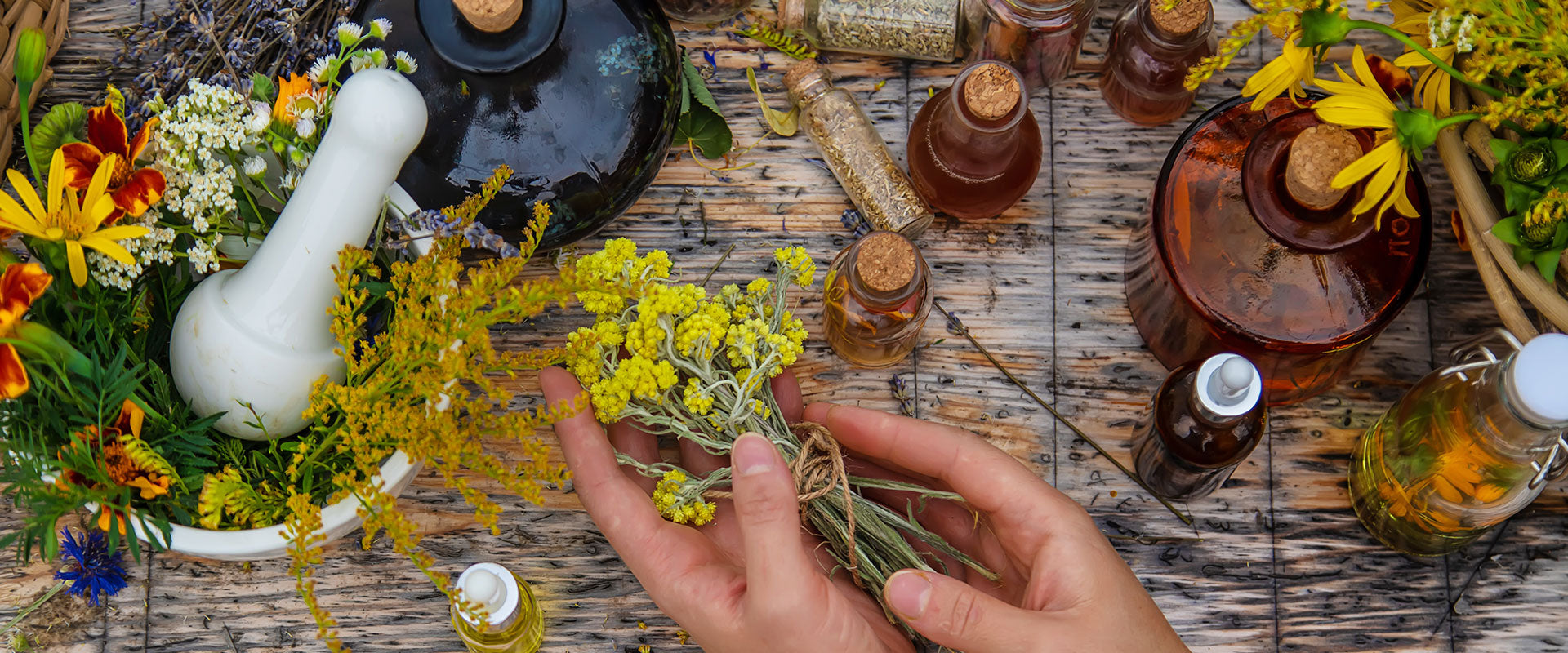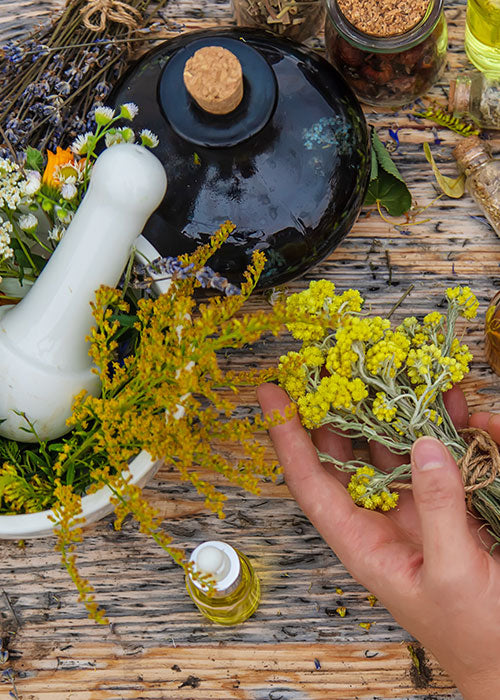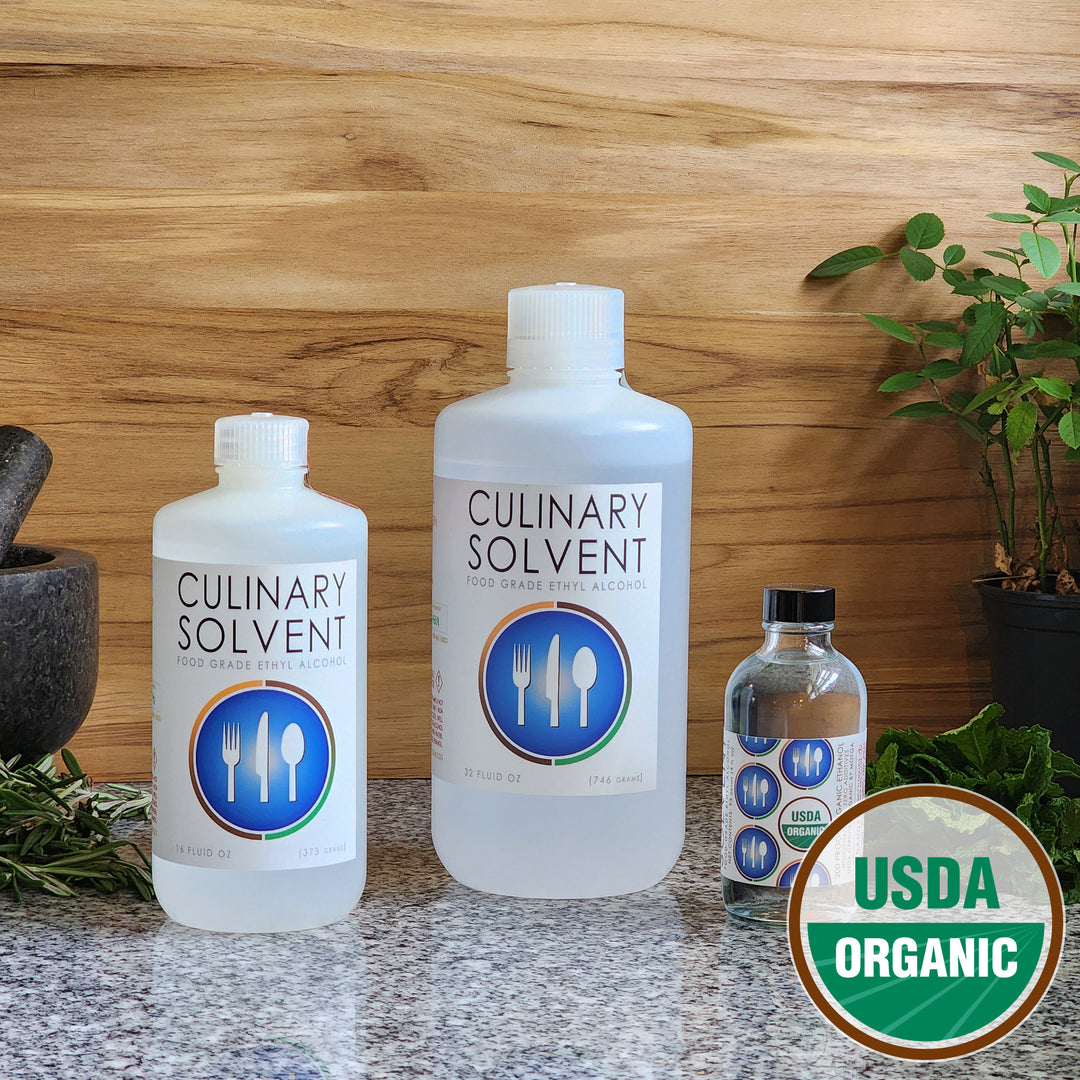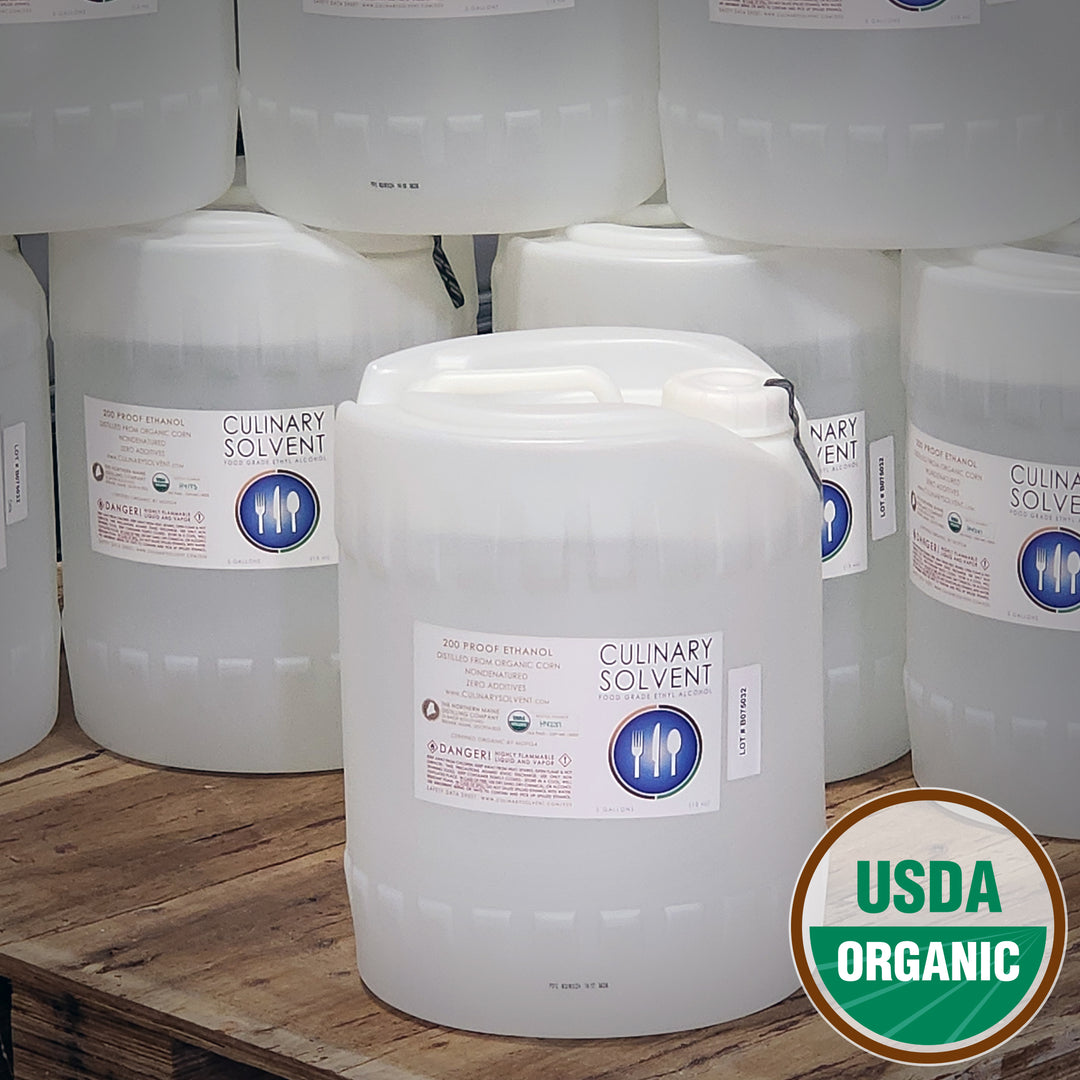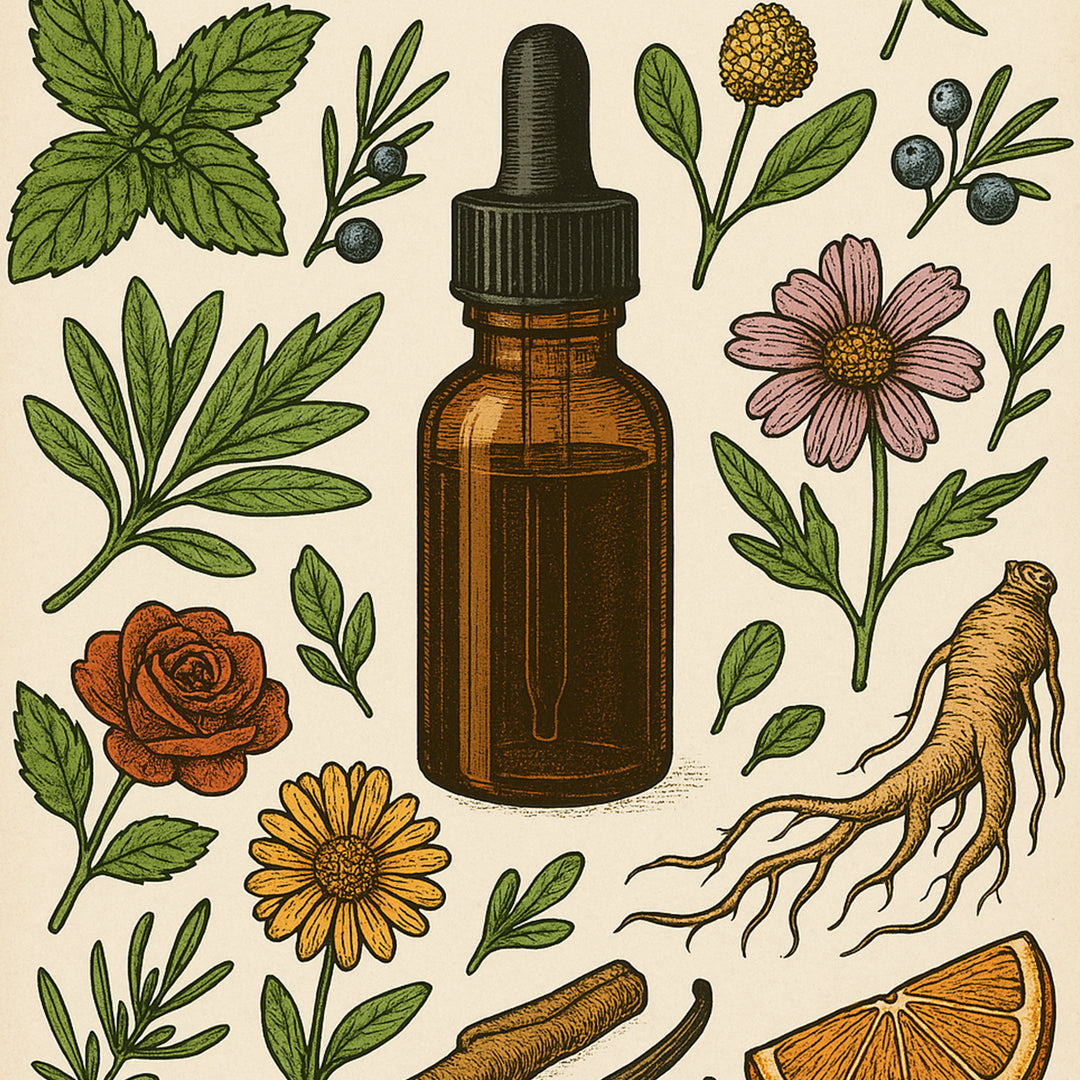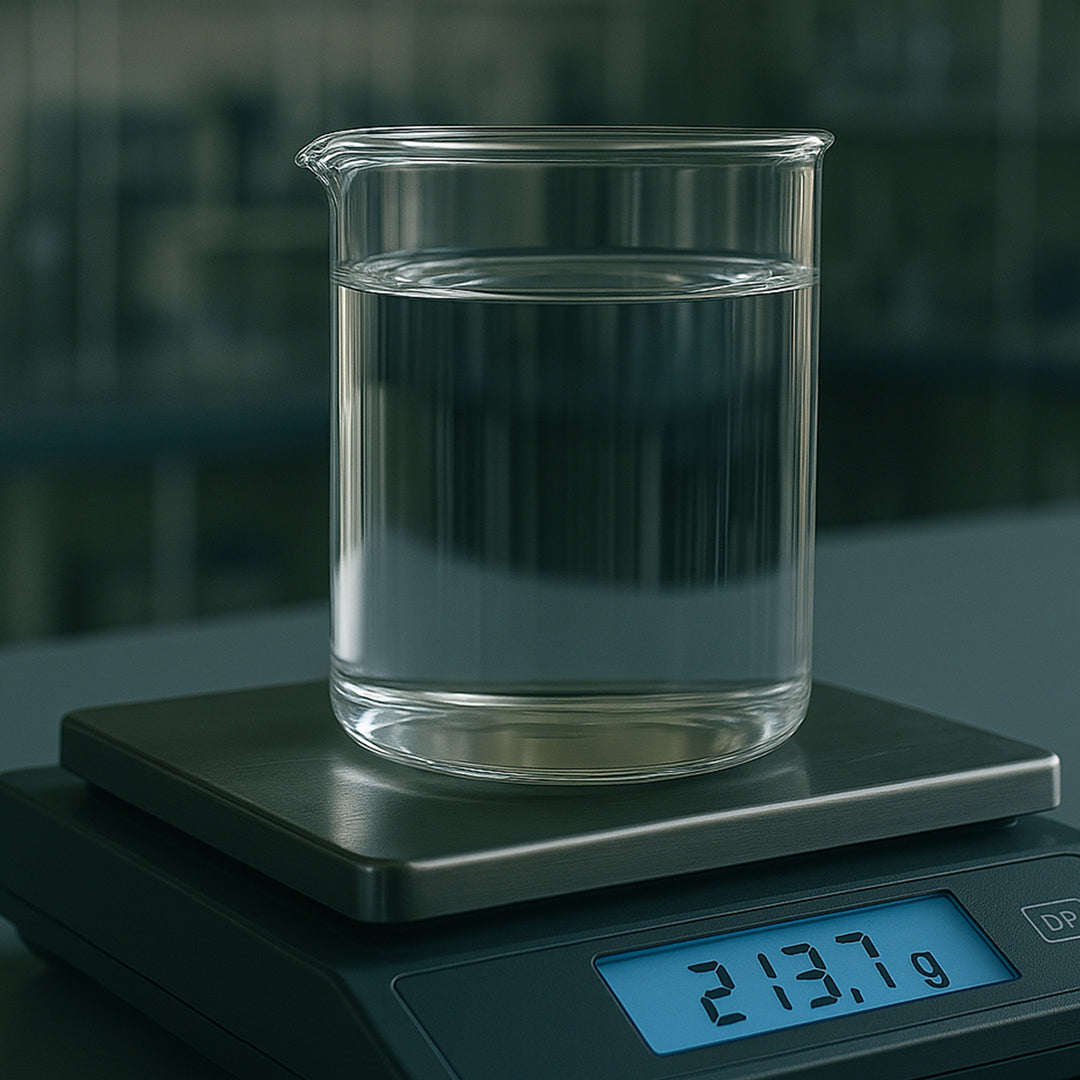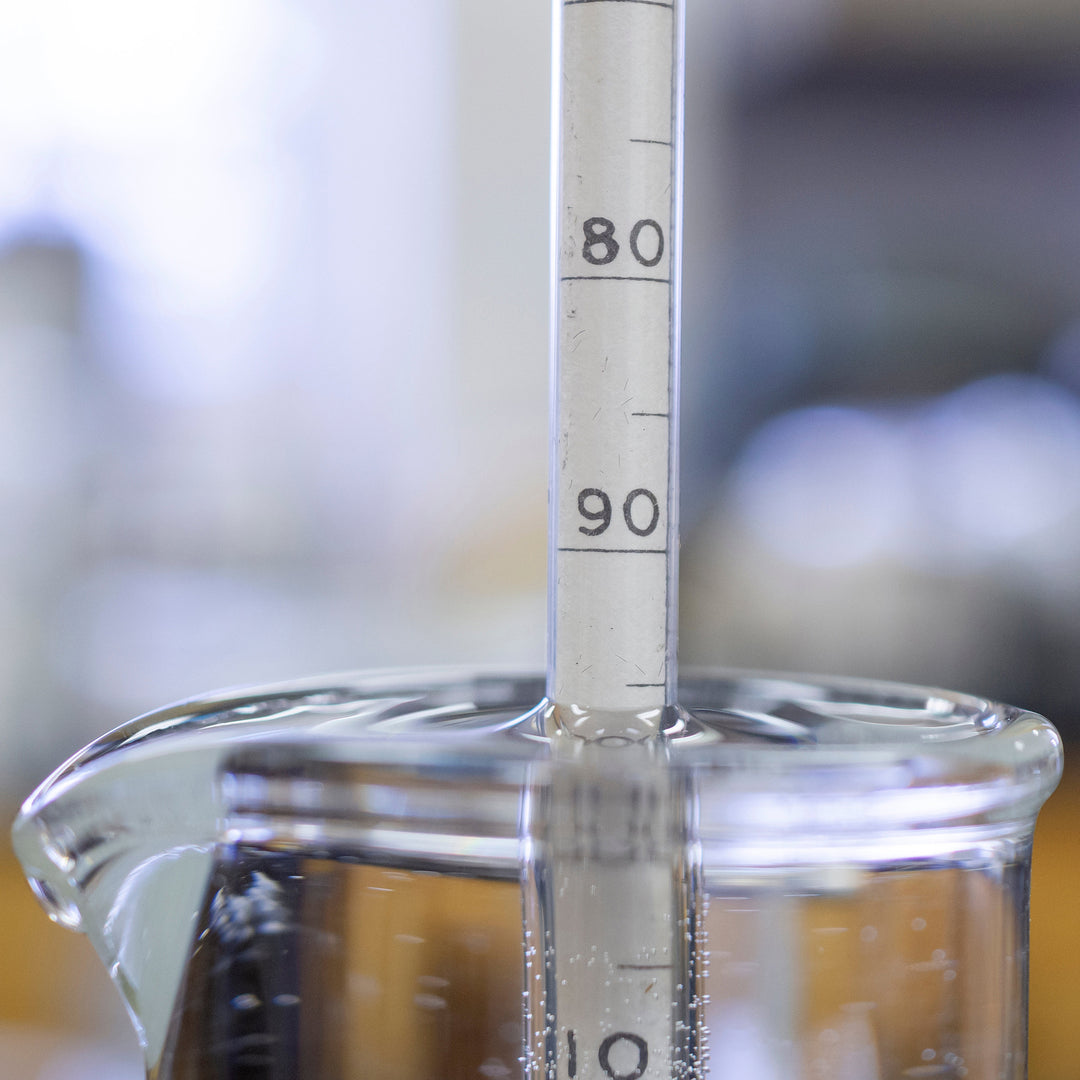Understanding 200 Proof Alcohol for Tinctures and Herbalists
Herbalists have long turned to diverse traditional methods and solvents from cultures around the world to make homemade tinctures and botanical extracts. Today, alcohol is the preferred menstruum for its ability to yield potent, shelf-stable extracts, though not all alcohols perform the same. This page examines each solvent option, compares them to alcohol, and shows why 200 Proof Food Grade Ethanol from CulinarySolvent.com is the ideal choice for high-quality, alcohol-based tinctures at home.
If you are new to tincture making, read our helpful introduction to herbal tincture and extract terms and various methodologies here.
Jump to a section on this page:
- About Alcohol for Herbal Tinctures
- Understanding Polar and Non-Polar Solvents
- Ethyl Alcohol vs Other (Non-Beverage) Alcohols for Tinctures
- 200 Proof Food Grade Ethanol vs Beverage Alcohols for Tinctures
- Alcohol vs Oil for Tinctures
- Alcohol vs Vegetable Glycerin for Tinctures
- Alcohol vs Vinegar for Tinctures
- Does USDA Certified Organic Matter for Tincture and Extracts?
- 5 Advantages of Using 200 Proof Food Grade Ethanol for Herbal Tinctures and Extracts
About Alcohol for Herbal Tinctures
Not all alcohol is equal. For tinctures, whether taken orally or applied topically, only pure, non-denatured ethyl alcohol should be used. Also known as ethanol, this is the only alcohol safe for consumption and skin application; isopropyl alcohol and methanol are toxic and contain denaturants. Although beverage alcohol such as beer, wine, and spirits contains ethanol, it is limited by proof, container sizes, and state regulations. For the highest purity and extraction efficiency, serious herbalists choose non-denatured, food grade ethanol.
Understanding Polar vs Non-Polar Solvents in Herbal Tincture Making
In tincture making, the type of solvent you use determines which compounds are extracted from your herbs or botanicals. This is where the concept of polar and non-polar solvents becomes important.
-
Polar solvents dissolve polar compounds (like salts, sugars, acids, and most water-soluble vitamins).
-
Non-polar solvents dissolve non-polar compounds (like oils, fats, terpenes, waxes, and some plant resins).
-
Some solvents (like ethanol) have both polar and non-polar characteristics, making them extremely versatile.
Why This Matters for Herbal Tinctures
When making a tincture, you want your solvent to match the polarity of the target compounds. For example:
-
To extract alkaloids, flavonoids, and glycosides, use a polar solvent.
-
To extract terpenes, waxes, and lipids, use a non-polar solvent.
-
If you want a broad-spectrum extract capturing a wide range of compounds, use a solvent with both properties.
| Solvent | Polarity | Notes on Tincture Use |
|---|---|---|
| Ethyl Alcohol (Ethanol) | Both polar and non-polar | The most versatile solvent for tincture making. It extracts both water- and fat-soluble compounds, making it ideal for full-spectrum herbal tinctures. 200 proof food grade ethanol is especially effective. |
| Vegetable Glycerin | Polar | Good for extracting water-soluble compounds. Has a sweet taste and is gentle, but less effective than alcohol at extracting fat-soluble or complex compounds. |
| Olive Oil, Avocado Oil, MCT Oil | Non-polar | Great for extracting lipophilic (fat-loving) compounds like cannabinoids and terpenes. Not suitable for extracting water-soluble components. Best used when making oil infusions or salves. |
| Vinegar (Acetic Acid) | Polar | Extracts water-soluble compounds. Milder than alcohol, often used in culinary applications or for people avoiding alcohol. Less effective for shelf life and full-spectrum extractions. |
When creating herbal tinctures, the choice of the base, whether alcohol, olive oil, or glycerin, plays a significant role in the final product's effectiveness, shelf life, and method of use. Each menstruum has its unique properties and benefits, making it important to consider your specific needs and goals for the tincture.
Ethyl Alcohol vs Other Alcohols for Herbal Tinctures
Description: Ethyl alcohol is the same alcohol found in beverage alcohol products and is the only chemical form of alcohol that is safe for ingestion and topical use. By contrast, isopropyl alcohol and denatured ethanol blends contain solvents and additives that are toxic and unsuitable for herbal tinctures.
Versatility: Ethyl alcohol extracts both water- and fat-soluble compounds and can be diluted to any desired strength; non-beverage alcohols cannot be customized safely and are excluded from edible or topical herbal preparations.
Capabilities: Pure ethanol dissolves alkaloids, glycosides, terpenes, essential oils, and vitamins; isopropyl alcohol and denatured ethanol may dissolve some compounds but introduce harmful denaturants and are not regulated for purity.
Advantages of Ethyl Alcohol for Tinctures:
- Safe for consumption and topical use when non-denatured and food grade
- Full-spectrum extraction, capturing both polar and non-polar plant constituents
- Customizable proof allows precise control over tincture strength
- Natural preservative extends shelf life to 5 + years
Risks of Using Non-Ethanol Alcohols:
- Isopropyl Alcohol: Highly toxic if ingested or absorbed through skin; can cause chemical burns and systemic poisoning.
- Denatured Ethanol: Contains bitterants and poisons (e.g., methanol, acetone) that pose severe health risks when used in tinctures.
- Unregulated additive levels lead to unpredictable toxicity and contamination.
200 Proof Food Grade Ethanol vs Beverage Alcohol Products for Herbal Tinctures
Description: 200 proof food grade ethanol is non-denatured, ultra-pure ethyl alcohol at 100% ABV; by comparison, 190 proof Everclear is 95% ABV (5% water) and typical vodka is 40% ABV (60% water), which influences extraction strength and preservation.
Versatility: Pure 200 proof ethanol can be diluted precisely to any target proof for different botanicals; Everclear’s fixed 190 proof offers high strength but limited custom dilution range; 80 proof vodka’s lower alcohol content restricts extraction of fat-soluble compounds and lengthens infusion time.
Capabilities: All three dissolve polar and non-polar constituents, but higher ABV yields more efficient extraction of resins, essential oils, and alkaloids. 200 proof ethanol maximizes yield; Everclear is slightly less potent; vodka’s high water content reduces solubility of non-polar compounds.
Advantages of 200 Proof Food Grade Ethanol:
- 100% ethanol allows exact dilution to optimize extraction ratios for any herb
- Extracts the full spectrum of water- and fat-soluble phytochemicals with maximum potency
- Acts as its own preservative, extending tincture shelf life to 5+ years
- Guaranteed non-denatured purity ensures no unwanted additives or congeners
Considerations When Using Beverage Alcohols:
- Everclear (190 proof): High strength but contains trace water that may slightly dilute potency; limited to 95% ABV, dilution below this requires additional water, impacting final proof accuracy.
- Vodka (80 proof): Widely available and palatable but low ABV means slower extraction, incomplete fat-soluble compound capture, and shorter shelf life (1–2 years).
- Flavor congeners in some vodkas can alter herbal taste profiles, whereas 200 proof ethanol from CulinarySolvent.com is flavor-neutral.
Oil vs Alcohol for Herbal Tinctures
Description: Carrier oils like olive, coconut (MCT), or avocado are non‑polar lipids used for oil infusions and salves. They provide a rich, emollient base for extracting fat‑soluble herbal compounds.
Versatility: Oils excel at topical and edible infusions but lack the broad‑spectrum extraction that ethanol offers. They cannot dissolve water‑soluble nutrients, but they shine in capturing cannabinoids, terpenes, and plant waxes.
Capabilities: Oils are non‑polar solvents which dissolve essential oils, fats, lipids, waxes, and some plant resins. Oils cannot dissolve polar compounds like most alkaloids, flavonoids, sugars, and vitamins.
Advantages of Oils for Tinctures:
- Ideal for topical applications and skin‑soothing balms
- Smooth, fatty mouthfeel for edible tinctures or cooking
- No alcohol taste, good for those avoiding ethanol
- Naturally moisturizing when applied to skin
Limitations of Oils For Tinctures:
- Cannot extract water‑soluble compounds (e.g., many vitamins, flavonoids)
- Shorter shelf life (6 – 12 months) and prone to rancidity
- Requires heat or long infusion times for effective extraction
- Thicker viscosity complicates precise dosing
Taste: Olive oil offers a grassy, peppery flavor; MCT oil is nearly flavorless with a light, oily mouthfeel; avocado oil has a buttery, nutty note. All contrast with ethanol’s neutral, non‑fatty profile.
Shelf Life: Oil infusions last about 6 – 12 months refrigerated. Ethanol tinctures outlast them by years, with no risk of rancidity.
Vegetable Glycerin vs Alcohol for Herbal Tinctures
Description: Glycerin is a sweet, syrupy liquid derived from plant fats. Its mild sweetness and smooth texture make glycerin-based tinctures more palatable for children or anyone sensitive to harsh alcohol flavors.
Versatility: Unlike 200 proof ethanol, which extracts both water‑ and fat‑soluble compounds, glycerin primarily pulls water‑soluble constituents. It works well for delicate extracts, mild infusions of floral or herbaceous notes, but cannot capture robust resins or lipids.
Capabilities: As a polar solvent, glycerin excels at dissolving polar compounds such as alkaloids, flavonoids, glycosides, salts, sugars, acids, and most water‑soluble vitamins. Glycerin cannot dissolve non‑polar compounds like waxes, terpenes, and oils, leaving behind fatty or resinous constituents.
Advantages of Glycerin for Tinctures:
- Gentle and sweet taste, no “burn” of high‑proof alcohol
- Non‑alcoholic, suitable for those avoiding ethanol
- Safe for children’s formulas and sensitive uses
- Smooth mouthfeel ideal for quick sublingual dosing
Limitations of Glycerin for Tinctures:
- Narrow extraction profile, misses lipophilic compounds (resins, essential oils)
- Thicker viscosity can complicate dosing and filtering
- Shorter shelf life and potential microbial growth without additional preservatives
- Higher cost per ounce compared to ethanol
Taste: Glycerin has a light, sweet, almost vanilla‑like flavor. By comparison, 200 proof ethanol distilled from corn is virtually flavorless and odorless, pure neutral alcohol that won’t alter herbal flavor profiles.
Shelf Life: Glycerin tinctures typically last 1 – 2 years if stored cool and dark. In contrast, ethanol‑based tinctures (particularly at full strength) can remain stable for 5 + years without preservatives.
Vinegar vs Alcohol for Herbal Tinctures
Description: Vinegar, typically apple cider or white distilled, is a tart, acidic liquid used to extract water‑soluble plant compounds. It imparts bright, tangy notes that complement culinary preparations.
Versatility: Vinegar extracts water‑soluble constituents and some organic acids. It’s great for culinary shrubs, culinary tinctures, and mild herbal preparations, but lacks the potency and preservation of ethanol.
Capabilities: Vinegar is a polar solvent which dissolves glycosides, sugars, acids, and some phenolics. Vinegar cannot dissolve non‑polar compounds like essential oils, waxes, or lipids.
Advantages of Vinegar for Herbal Tinctures:
- Alcohol‑free, safe for all ages
- Adds natural acidity and flavor to culinary recipes
- Easy and inexpensive to source
- Mild extraction, preserves delicate flavors without harsh tincture taste
Limitations of Vinegar For Herbal Tinctures:
- Limited shelf life (6 – 12 months) even when refrigerated
- Cannot extract full spectrum of therapeutic compounds (no lipophilic extraction)
- Acidic taste may overpower subtle botanicals
- Offers little antimicrobial preservation compared to high‑proof ethanol
Taste: Vinegar is characteristically sharp and tangy. It contrasts strongly with ethanol’s clean, almost imperceptible flavor.
Shelf Life: Vinegar tinctures generally hold for 6 – 12 months refrigerated. Ethanol tinctures, in comparison, remain potent and shelf‑stable for 5 + years.

Do Organic Ingredients Matter for Herbal Tinctures and Extracts?
When crafting your own homemade tinctures or extracts, the quality of your ingredients plays a critical role in the effectiveness and overall integrity of your final product. By taking the time to carefully choose ingredients with known origins, you ensure that your recipe not only reflects the best of your efforts but also delivers the highest level of purity and potency.
One way to guarantee the quality of your ingredients is by looking for the USDA Certified Organic seal. This certification signifies that the product has met strict standards for organic farming, sustainability, and the absence of harmful chemicals throughout the growing and manufacturing process.
Choosing USDA Certified Organic herbs, roots, fruits, and other ingredients provides peace of mind that your tincture or extract is free from pesticides, synthetic additives, or GMOs.
This attention to detail should also extend to the solvent you use to prepare your tincture or extract. Using USDA Certified Organic food grade ethanol, ensures that your final product remains free from unwanted additives, impurities, or non-sustainable farming practices.
By prioritizing organic ingredients, including your choice of ethanol, you elevate the quality of your tinctures and extracts, creating remedies and recipes that are as pure and effective as nature intended. For those who value sustainability, transparency, and exceptional results, investing in organic options is a step toward crafting tinctures and extracts you can trust.
5 Advantages of Using 200 Proof Food Grade Ethanol for Herbal Tinctures and Extracts
- Efficient Extraction: 200 proof food grade ethanol is an excellent solvent for extracting a wide range of active compounds from herbs and plants, such as alkaloids, glycosides, and volatile oils. This results in a concentrated and potent tincture and extract.
- Purity and Safety: Food grade ethanol is free from harmful additives and contaminants, ensuring that your herbal tinctures are safe for consumption and retain their natural healing properties.
- Preservation: The high alcohol content (ABV) of 200 proof food grade ethanol acts as a natural preservative, maintaining the potency and shelf life of your tinctures while preventing the growth of harmful bacteria or mold.
- Versatility: Food grade ethanol can be used as a solvent for both fresh and dried plant materials, allowing herbalists and naturopaths to create tinctures from a diverse range of herbs and plants.
- Customizable Strength: Depending on the desired final alcohol content, 200 proof food grade ethanol can be further diluted with water, oil, or glycerin, allowing you to create tinctures with varying strengths tailored to specific applications.




